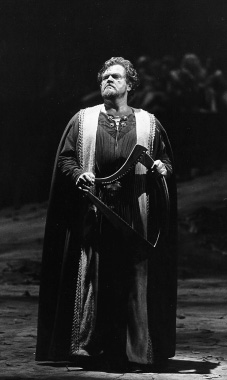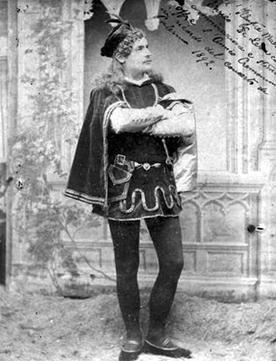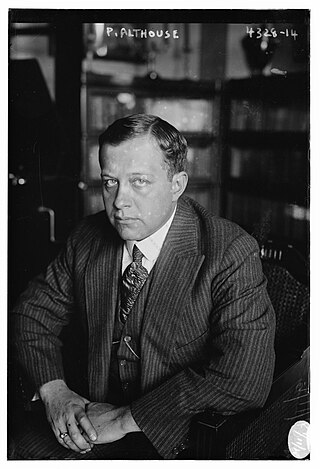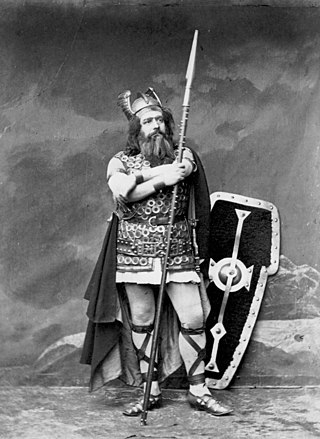
Jonathan Stewart Vickers,, known professionally as Jon Vickers, was a Canadian heldentenor.
Ludwig Suthaus was a German operatic heldentenor.

Günther Treptow was a German operatic tenor, best known for Wagner roles.

Richard Cassilly was an American operatic tenor who had a major international opera career between 1954–90. Cassilly "was a mainstay in the heldentenor repertory in opera houses around the world for 30 years", and particularly excelled in Wagnerian roles like Tristan, Siegmund and Tannhäuser, and in dramatic parts that required both stamina and vocal weight, such as Giuseppe Verdi's Otello and Camille Saint-Saëns's Samson.

Giuseppe Cremonini was an Italian operatic tenor who had a prominent opera career in Europe and the United States during the last decade of the nineteenth century.

Paul Shearer Althouse was an American opera singer. He began his career as a lyric tenor with a robust Italianate sound, in roles including Cavaradossi in Tosca, Pinkerton in Madama Butterfly, and Turiddu in Cavalleria rusticana. He later branched out into the dramatic tenor repertoire, finding success in portraying Wagnerian heroes. He sang with the Metropolitan Opera in New York City for 30 years.

Albert Reiss also Albert Reiß was a German operatic tenor who had a prolific career in Europe and the United States during century. He spent much of his career performing at the Metropolitan Opera where he sang in more than 1,000 performances, including several premieres, between 1901–1919. Excelling in the tenor buffo repertoire, Reiss was particularly associated with the roles of David in Wagner's Die Meistersinger von Nürnberg and Mime in Der Ring des Nibelungen, two roles he sang in numerous houses internationally.
Antonio Magini-Coletti was a leading Italian baritone who had a prolific career in Europe and the United States during the late 19th century and the early part of the 20th century. A versatile artist, he appeared in several opera world premieres but was particularly associated with the works of Giuseppe Verdi, Richard Wagner and the verismo composers. He was also an accomplished exponent of the bel canto repertoire.
Hermann Rieth was a German operatic bass.
Hector Dupeyron (1861–1911) was a French operatic tenor who had a prolific opera career in Europe from 1887 through 1906. Possessing a powerful and dramatic voice, he particularly excelled in the works of Richard Wagner and Giacomo Meyerbeer.

Karel Burian was a Czech operatic tenor who had an active international career spanning the 1890s to the 1920s. A Heldentenor, Burian earned acclaim in Europe and America for his powerful performances of the heaviest Wagnerian roles. His voice is preserved on numerous recordings made for Pathé Records, the Gramophone Company, the Gramophone & Typewriter Company and the Victor Recording Company.

Heinrich Vogl was a German operatic heldentenor.

Adolf Robinson (1838–1920) was an Austrian baritone who had a major opera career during the second half of the 19th century. His extensive stage repertoire contained numerous Wagnerian roles such as Wotan in The Ring Cycle and Hans Sachs in Die Meistersinger von Nürnberg. Other highlights of his career included the title characters in Rossini's William Tell, Mozart's Don Giovanni, Verdi's Rigoletto, Hérold's Zampa, and Heinrich Marschner's Der Templer und die Jüdin.

Edyth Walker was an American opera singer who had an active international career from the 1890s through the 1910s. She began her career performing roles from the mezzo-soprano repertory, but later successfully added several soprano parts to her repertoire as well. While she did perform in Italian and French language operas, she had a clear affinity for works in the German language. She particularly excelled in the operas of Richard Wagner. After retiring from the stage, she was active as a voice teacher in both France and the United States. Her voice is preserved on several gramophone recordings, made mainly for His Master's Voice, between 1902-08.
Gerd Brenneis was a German operatic tenor who had an active international career from the late 1950s through the 1990s. Known for his interpretations of the works of Richard Wagner, he worked as a principal artist at many of the world's great opera houses, including the Deutsche Oper Berlin, La Scala, the Metropolitan Opera, and the Vienna State Opera.

Leopold Demuth (real name Leopold Pokorny was a Moravian operatic baritone. He was celebrated in particular for his successful performances in works by Wolfgang Amadeus Mozart, Giuseppe Verdi and Richard Wagner.

Theodor Bertram was a German bass-baritone prominent in the operas of Richard Wagner. A regular performer at the Bayreuth Festival from 1901 to 1906, he was greatly admired for his portrayals of Wagnerian heroes and particularly Wotan. Bertram was born in Stuttgart and died by suicide in Bayreuth following the death of his second wife, Lotte Wetterling. His first wife was the soprano Fanny Moran-Olden who was also a prominent Wagnerian singer.

Gustav Siehr was a German Hofoper- and Kammersänger bass.
Ludwig Zottmayr was a German bass-baritone. He is known for creating the role of King Marke in Wagner's Tristan und Isolde at its 1865 premiere at the Bavarian court opera in Munich.

Louise Amalie Janssen was a Danish-born operatic soprano who spent most of her life in France. She is remembered for the many Wagnerian roles she sang principally at the Grand Théâtre de Lyon from 1890 to 1912, becoming known as Lyon's Wagnerian diva. The theatre was granted permission to hold the French premieres of some of Wagner's stage works, and she appeared there as the first Eva in Die Meistersinger von Nürnberg in 1896, and Brünnhilde in Götterdämmerung in 1903. In 1893, she took part in the premiere of the French version of Wagner's Die Walküre at the Paris Opera, as Siegrune. From 1906, she toured the United States and also sang in Monte-Carlo, but Lyon remained her centre where she taught voice and opera after her retirement in 1912.














